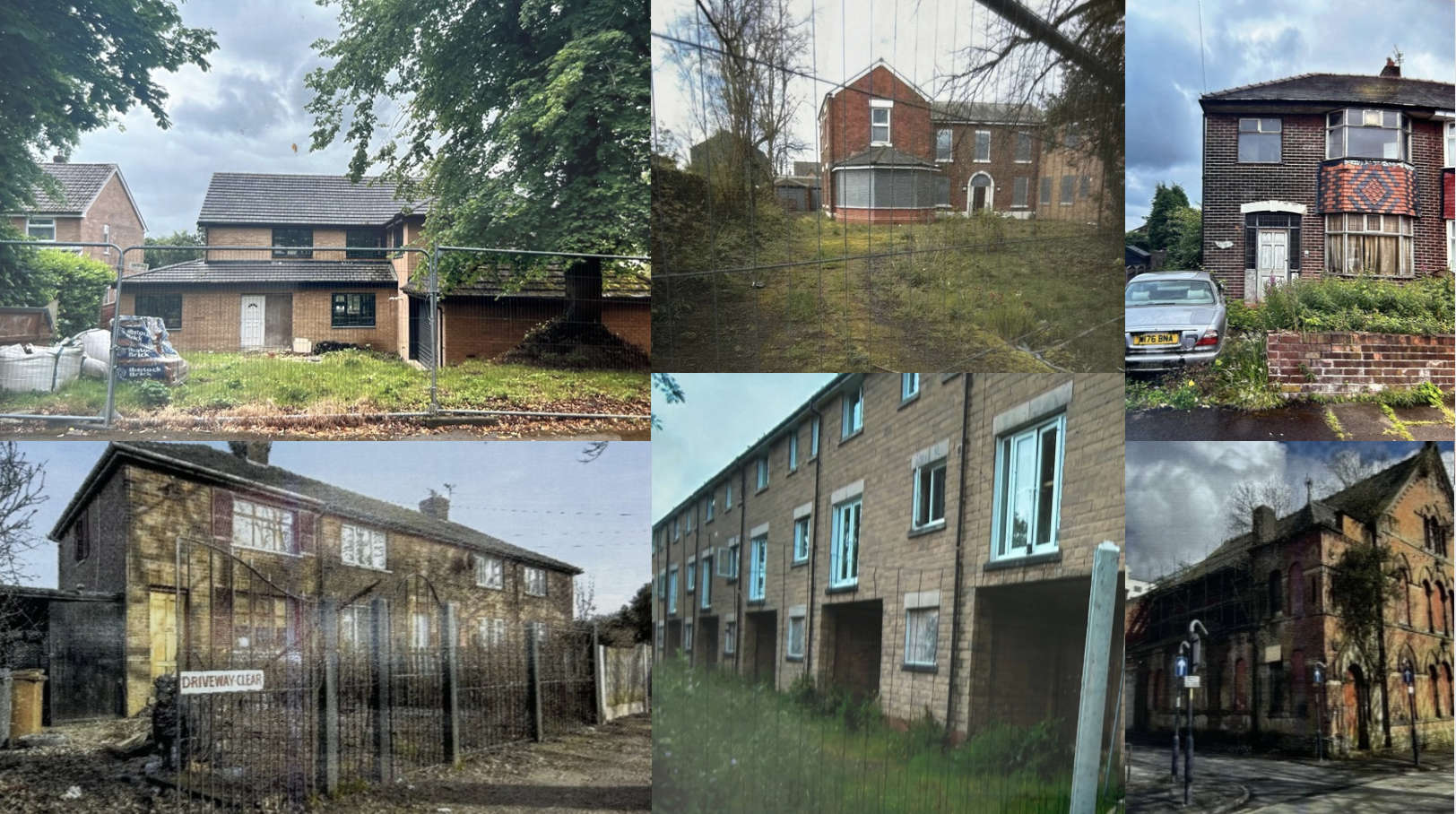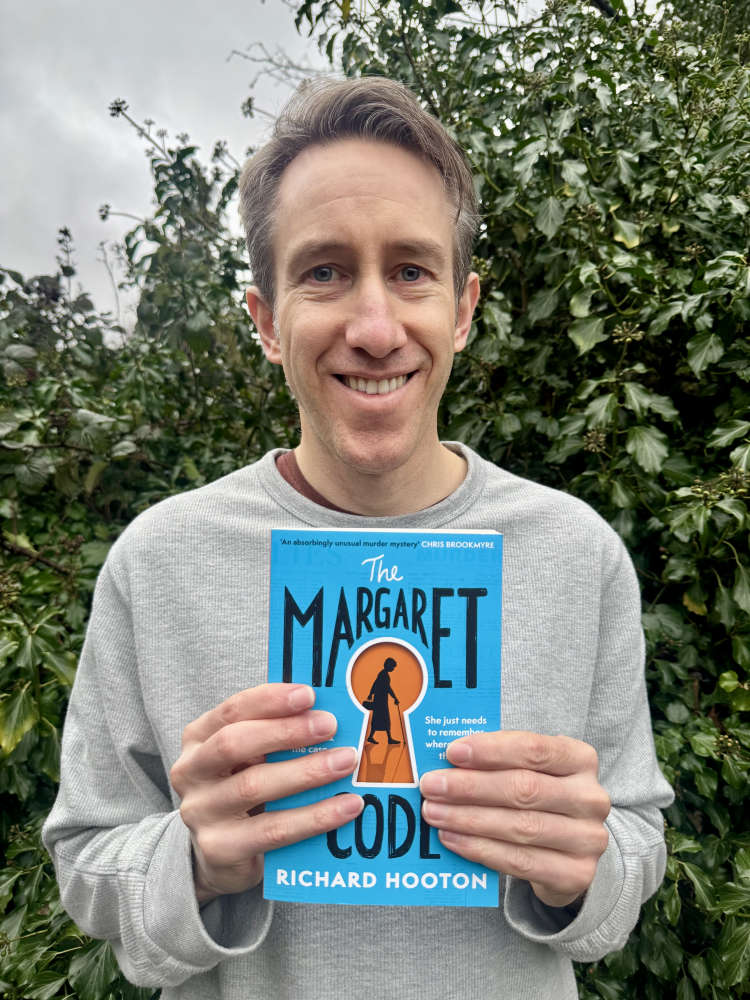
Tameside currently has more than 500 completely vacant properties, according to an independent survey carried out by retired estate agent Stephen Gooderson.
In 2022, it was estimated that 557 people were homeless in Tameside on any given night – including 287 children. This figure, reported by the homelessness charity Shelter, equates to one in every 415 people in the area.
Stephen, from Stalybridge, began his survey 10 months ago after researching the general housing market and discovering that there are 700,000 empty and derelict properties across the UK.
In Stephen's survey, a "ghost home" was characterised as a property that had stood empty for two years or more.
Houses can become "ghost homes" for a number of reasons, including family disputes, financial difficulties, planning permission issues, market conditions, structural problems, environmental hazards or simply neglect and decay.
"The housing market at the moment is just totally broken," Stephen said.
"It's just a tragic waste of resources, when these properties could be brought back into use at an affordable price."
He added: "All of these problems are self-made. Are we eventually going to become a nation where most of us will be renting? We need to lay some long-term foundations for how we can house people. The local authority has the power to sort this; they need to use common sense and work with us."
Some of the buildings outlined in Stephen's survey include: Millbrook Mill and Ibex Mill, the former Wesleyan Sunday School on Crown Street in Ashton, a 3-bed property on Water Street in Stalybridge, a property on Dowson Road in Gee Cross and two blocks of flats.
Tameside Council's Housing Strategy 2021-26 acknowledges the borough's "empty homes problem" and emphasises the importance of returning these homes to use to increase the overall housing supply.
However, with housing insecurity and homelessness on the rise, Stephen is urging the Council to take immediate action.
He said: "The local authority has done absolutely nothing. The stock of empty houses has actually compounded since this strategy was released.
"Maybe they lack the appetite, staff or funding, but if the Government and local authority communicated, it would be more economical to bring these homes back into use than to house people in hotels."
Stephen approached Manchester City Council, Tameside Council and Jigsaw Homes on two occasions in regard to properties being made available for them to use as emergency housing but received no response.
The Council's Housing Strategy also highlights the need for 720 additional wheelchair-friendly homes by 2035, including 187 fully wheelchair-adapted properties.
Last year, Stephen proposed a scheme to tackle this issue and presented it to the Council's planning panel. The proposal detailed a small site he had acquired on Smith Street, Dukinfield, with easy access to local doctors, dentists and shops.
Developers planned to build four one-bed detached bungalows with features to help people live independently, including wheelchair access, easily accessible wet rooms, a high level of security and a private outside space.
The scheme was rejected due to tree preservation orders and potential traffic congestion and is currently under appeal.
Stephen also expressed concern about families being housed in the Victoria Park Hotel as emergency accommodation and questioned whether local authorities check the places they are putting people.
On the hotel's TripAdvisor page, it is compared to a "bushtucker trial". Guests share disgust at the "filthy" state of the place, noting mouldy food in the rooms, stained bed sheets, cockroaches and showers "full of mould and hair".
At the beginning of 2023, Stephen and his wife sourced a total of 50 properties to house Ukrainian refugees and paid the rent for 12 months, through doing this the pair were able to help 18 families fleeing the war-torn country.
However they were approached by the Council and told that two of the properties didn't comply with regulations due to having no lock on the bathroom door.
"So let me get this right - you live in the Ukraine, you've just seen your neighbour's house get blown up, tanks are coming down the street, you're scared to death and somehow you manage to get out of the country and over to the UK, somebody provides you with a home, pays for the first 12 months of rent, puts you in touch with people who will help you get things organised, then the council rock up and what can they do for you? Well actually, they can evict you because there's not a lock on the toilet door. A great contribution from the Council.
"Nobody asks questions about the rules nowadays. Is it outdated? Is it silly? Is it necessary? Is it quite the end of the world? After what they've experienced, would we rather they sleep on the street or in a nice, warm home but without a lock on the bathroom door?
"It's shameful - the Council seem to be very good at throwing the rule book at people but don't seem to be able to take a look at the things they are, themselves, enforcing."
Bibby Stockholm, the barge moored at Portland, Dorset, which is being used as an accommodation vessel for asylum seekers, is costing £34.8 million to run during 2023/24 which is the equates to almost £4,500 per month per head, NAO figures disclosed.
This works out at around £6000 per month per migrant, but Stephen and his wife housed 150 Ukrainians for £4,300 per person for a full year.
To address the issue of empty homes, Stephen has come up with two strategies.
The first involves what he calls a Housing Bond. This would involve the Government inviting the public to buy Premium Bond-style shares into the housing market. After investing in the bond, you would be "locked in" for a set amount of time and the Government would use the substantial fund gathered to build or purchase new council houses.
Rent money would feed back into the Housing Bond, providing investors with a fixed amount of interest each year.
By this point, the Government would be obtaining funding directly from the public, not only providing investors with a better return on their money, but also benefiting society by housing more people without requiring significant expenditure.
Stephen's second scheme focuses on ground-floor offices and shops in city centres.
The Government would provide grant funds to local authorities, who would grant shop or office owners funds to convert upstairs spaces into flats.
This would create work for the building industry and generate income tax for the treasury, and due to it being on a grant the building companies would have an apprenticeship scheme. The converted flats would be offered as social housing at below-market rents, reducing social housing waiting lists and providing affordable housing.
Rent would be paid to the landlord and maintenance would be paid back to the Government over ten years, meaning the cost of grants to create new apartments would be repaid in full, without costing the Government any money.
Tenants would be supporting local businesses and the value of the property would be enhanced so when the owner comes to sell it, they will pay more capital gains tax.
Tameside Council was approached for a comment.

 Family launches petition for change in law following sisters' death
Family launches petition for change in law following sisters' death
 Service in special measures has ‘foundations of improvement’
Service in special measures has ‘foundations of improvement’
 Mossley writer celebrates paperback release after rave reviews for debut novel
Mossley writer celebrates paperback release after rave reviews for debut novel
 Award-winning family pantomime comes to Hyde Little Theatre for World Book Week
Award-winning family pantomime comes to Hyde Little Theatre for World Book Week


